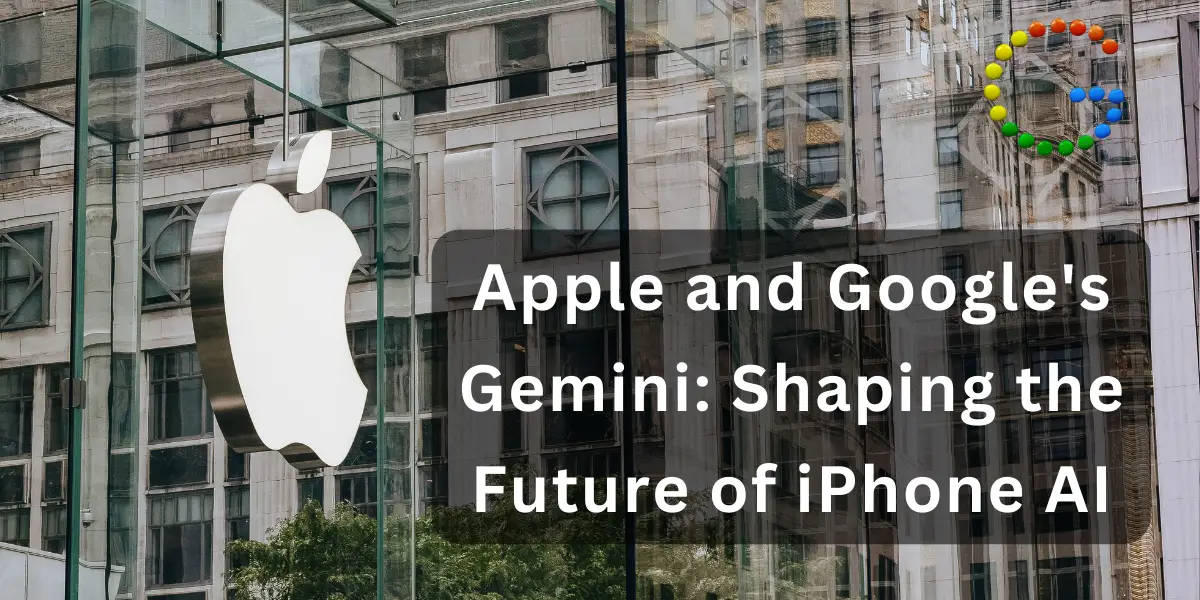Apple and Google's Gemini: Shaping the Future of iPhone AI

The integration of Google’s Gemini into Apple’s ecosystem is not just a leap forward in technology; it’s a stride towards an unprecedented synergy between two tech giants. This partnership is poised to harness the strengths of both companies, combining Google’s advanced AI technology with Apple’s unparalleled user experience, setting new standards for smartphone intelligence.
Apple and Google’s partnership on Gemini AI integration into the iPhone is set to revolutionize user experiences with advanced AI capabilities, including enhanced Siri interactions, AI-powered creativity tools, and improved accessibility features. This collaboration promises to blend Google’s AI expertise with Apple’s innovative ecosystem, marking a pivotal shift in mobile technology’s future.
Table of Contents
What's Sparking Apple's AI Revolution?
Apple‘s push towards an AI revolution stems from the burgeoning demand for smarter, more intuitive technology. With competitors like Google and Samsung making significant strides in artificial intelligence, Apple’s decision to integrate Google’s Gemini into its ecosystem signals a strategic move to not only catch up but potentially leapfrog in the AI space. This initiative is likely fueled by the desire to enhance user experiences, offering more personalized, efficient, and interactive features. The convergence of Apple’s hardware prowess with advanced AI capabilities promises to unlock new dimensions of smartphone utility and sophistication, ensuring Apple remains at the forefront of technological innovation.
What Exactly Is Google's Gemini?
Google’s Gemini is a comprehensive suite of generative AI tools designed to revolutionize how we interact with technology. It encompasses a range of applications from sophisticated chatbots capable of engaging in human-like conversations to advanced coding assistants that streamline software development. At its core, Gemini aims to enhance productivity, creativity, and communication through AI-driven insights and solutions. Its integration into various platforms underscores Google’s commitment to making AI more accessible and impactful across different sectors. With its powerful capabilities, Gemini stands as a testament to Google’s leadership in the AI domain, offering a glimpse into the future of digital interaction.
How Might Apple Integrate Google's Gemini?
The integration of Google’s Gemini into Apple’s ecosystem could take several transformative paths. Primarily, it might serve as the backbone for enhancing Siri’s capabilities, making the assistant more responsive, context-aware, and capable of handling complex queries. Additionally, Gemini’s advanced text and image generation tools could introduce new features for content creation, enabling users to generate creative works or professional content with simple prompts. Furthermore, Gemini could bolster iOS’s accessibility features, offering more nuanced and effective support for users with disabilities. This collaboration could redefine the iPhone experience, marrying Apple’s intuitive design and user-centric philosophy with the cutting-edge AI capabilities of Gemini.

What Are the Key Features of iOS 18's AI?
iOS 18 is poised to be a significant leap forward for Apple, introducing a suite of AI-powered features that promise to redefine the iPhone experience.
Enhanced Siri Interactions
- More natural, conversational dialogue
- Improved context understanding for queries
- Personalized recommendations and assistance
The evolution of Siri into a more conversational, context-aware assistant is a highlight of iOS 18. By integrating Gemini’s AI, Siri is expected to understand and engage with users more naturally, offering solutions and recommendations that are tailored to their preferences and current context. This could include anything from suggesting activities based on the weather to offering advice on complex queries.
Advanced Content Creation Tools
- AI-driven text generation
- Sophisticated image creation capabilities
iOS 18 aims to empower users with advanced tools for creativity, leveraging Gemini’s generative AI for text and image production. Users could generate blog posts, stories, or professional documents with simple prompts, as well as create images that align with their vision, all facilitated by intuitive AI interfaces.
Real-Time Translation and Accessibility Enhancements
- Instant translation across multiple languages
- Enhanced support for users with disabilities
A key feature of iOS 18 is its focus on breaking down communication barriers and enhancing accessibility. With real-time translation, users can converse in multiple languages seamlessly. Additionally, the OS is expected to introduce new accessibility features, making technology more inclusive for users with varying needs.
Where Does Apple Stand in AI Development?
Apple’s position in AI development is nuanced, reflecting a blend of in-house innovation and strategic partnerships. While historically more reserved in its AI endeavors, Apple is making significant strides, particularly in integrating AI into user experiences, privacy enhancements, and developer tools. The company’s approach focuses on leveraging AI to enhance the seamless and intuitive interaction that users expect from Apple products, rather than leading the charge in AI research.
In-House AI Technologies
Apple has quietly built a robust foundation in AI, focusing on technologies that enhance user privacy and device functionality. Projects like the A-series chips demonstrate Apple’s commitment to powerful, efficient processing capable of supporting AI tasks directly on devices. This emphasis on privacy and on-device processing sets Apple apart, offering users powerful AI features without compromising their data.
User Experience Enhancements
Apple’s AI efforts are most visible in its relentless pursuit of enhancing the user experience. From Siri’s ongoing improvements to the sophisticated machine learning algorithms driving Face ID, Apple’s AI is designed to make interactions with devices more natural and intuitive. These advancements reflect a deep understanding of how AI can serve users, making technology an extension of human capabilities.
Developer Support
Supporting developers in creating AI-powered applications has become a priority for Apple. With tools like Core ML and Create ML, Apple provides a platform for developers to easily integrate machine learning models into their apps. This ecosystem approach not only enriches the App Store but also encourages innovation, allowing Apple to benefit from a wide range of AI applications without developing everything in-house.
How Does Google's Gemini Compare to Apple's AI Efforts?
Google’s Gemini and Apple’s AI efforts represent two different philosophies in the development and application of artificial intelligence. While both aim to enhance technology’s role in everyday life, their approaches and areas of focus diverge, highlighting the unique strengths and strategies of each company.
Breadth of AI Applications
Google’s Gemini, with its broad suite of generative AI tools, showcases the company’s leadership in AI research and application. Gemini’s capabilities, ranging from natural language processing to image generation, are a testament to Google’s expansive approach to AI, aiming to integrate AI across a wide array of products and services. This contrasts with Apple’s more focused approach, where AI enhancements are closely tied to improving the core user experience of its products.
Open AI Ecosystem vs. Integrated User Experience
Google has cultivated an open AI ecosystem, encouraging developers and businesses to utilize its AI technologies. This strategy has made Google’s AI capabilities highly visible and widely used across different sectors. Apple, in contrast, integrates AI more tightly within its ecosystem, focusing on how AI can enhance the seamless and intuitive user experience that defines its products. Apple’s strategy emphasizes control and integration, ensuring that AI supports its broader vision for how technology should interact with users.
Privacy and Data Handling
One of the most significant differences lies in how each company approaches data handling and privacy within AI development. Apple prioritizes user privacy, with a strong emphasis on on-device processing to minimize data exposure. Google, while also committed to user privacy, operates in a domain where extensive data collection and cloud processing are more common. This fundamental difference influences the design and functionality of their AI offerings, with Apple focusing on privacy-respecting, device-based AI, and Google leveraging cloud computing for more powerful, data-intensive AI applications.
What Benefits Could Consumers Expect?
The collaboration between Apple and Google to integrate Gemini into the iPhone’s ecosystem marks a significant milestone in AI’s role in enhancing consumer technology. This partnership is poised to bring a range of benefits to users, from more personalized interactions with their devices to breakthroughs in creativity and productivity. Let’s explore some of the key benefits consumers can expect.
Enhanced Personalization
The integration of advanced AI technologies like Google’s Gemini into Apple devices promises to bring a new level of personalization to the user experience. This means that devices could become more adept at understanding individual user preferences, habits, and needs, adjusting functionalities accordingly. Whether it’s through more accurate recommendation systems, predictive text that better reflects your style, or apps that adapt to your usage patterns over time, the end result is technology that feels uniquely tailored to you.
Breakthroughs in Creativity
The potential for AI-powered tools to revolutionize creative workflows is immense. With features such as advanced image and text generation, users from all walks of life—from professional designers to hobbyists—can expect to see new avenues for creativity open up. These tools could lower the barriers to creative expression, making it easier to bring ideas to life without the need for extensive training or technical skills. The impact could be particularly significant in fields like graphic design, content creation, and digital art, where AI can offer new ways to explore and innovate.
Improved Accessibility
One of the most meaningful benefits of AI integration is the potential to make technology more accessible to everyone. By leveraging AI for features such as real-time voice-to-text transcription, enhanced voice commands, and more intuitive user interfaces, Apple could significantly improve the usability of its devices for individuals with disabilities. These advancements could make it easier for people to communicate, access information, and use technology independently, helping to bridge the digital divide and ensure that the benefits of technology are shared more widely.
What's Next for AI in Apple's Ecosystem?
As Apple continues to explore the possibilities of AI, the future of its ecosystem looks bright, with potential advancements that could further transform how we interact with technology. The integration of Google’s Gemini is just the beginning, with numerous possibilities on the horizon.
Deeper Integration Across Devices
Looking ahead, we can expect to see AI becoming more deeply integrated across Apple’s entire range of products, from iPhones and iPads to Macs and even the HomePod. This could mean more unified and coherent AI functionalities that enhance the Apple ecosystem, making devices work together more seamlessly and intelligently. Such integration could enable scenarios where your devices anticipate your needs across contexts, providing a truly integrated and personalized technology experience.
Advancements in On-Device AI
Apple’s commitment to privacy and on-device processing suggests that we will see significant advancements in on-device AI capabilities. This could include more powerful AI models that run directly on your iPhone or iPad, offering enhanced performance and functionality without compromising your data privacy. These advancements could lead to faster, more responsive AI features that are accessible even without an internet connection, from real-time language translation to advanced image editing and beyond.
Expansion of AI-Powered Health and Wellness Features
Apple has already made strides in health and wellness through its Apple Watch and Health app, but with AI, these efforts could go even further. Future developments might include more sophisticated health monitoring features, predictive analytics for preventive care, and personalized fitness and wellness recommendations. By harnessing the power of AI, Apple could provide users with deeper insights into their health and well-being, offering tools and recommendations that support a healthier lifestyle.
In conclusion, the future of AI in Apple’s ecosystem is not just about enhancing current functionalities but reimagining what technology can do. As AI continues to evolve, the possibilities are limitless, promising a future where technology is more personal, creative, and accessible than ever before.
Conclusion
The partnership between Apple and Google to integrate Gemini into the iPhone marks a significant moment in the evolution of AI in consumer technology. This collaboration not only underscores the importance of AI in the future of mobile computing but also sets the stage for a new era of intelligent, user-centric devices. As we look to the future, the potential of AI to redefine our interaction with technology has never been more evident.

